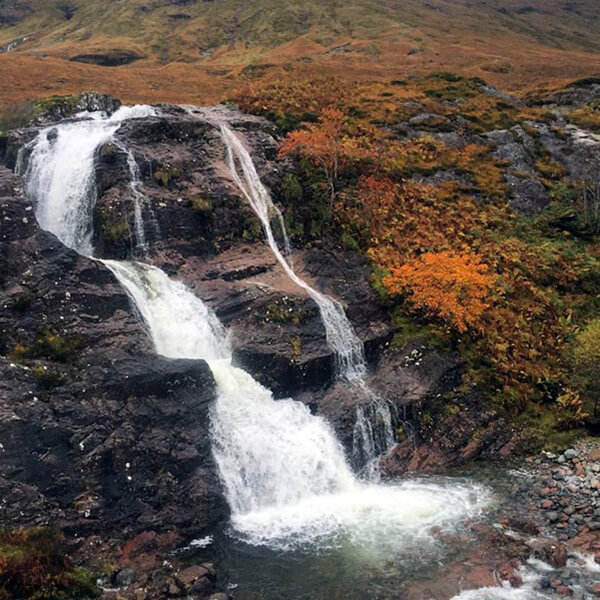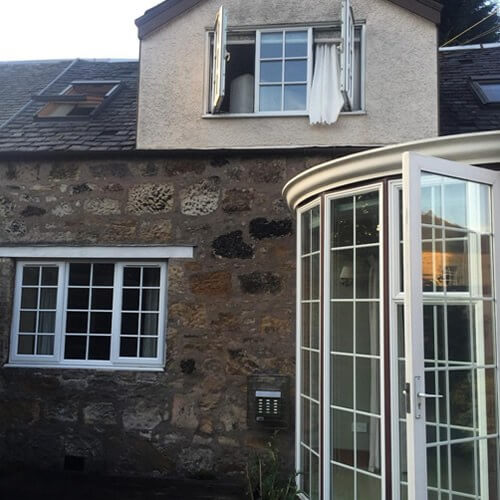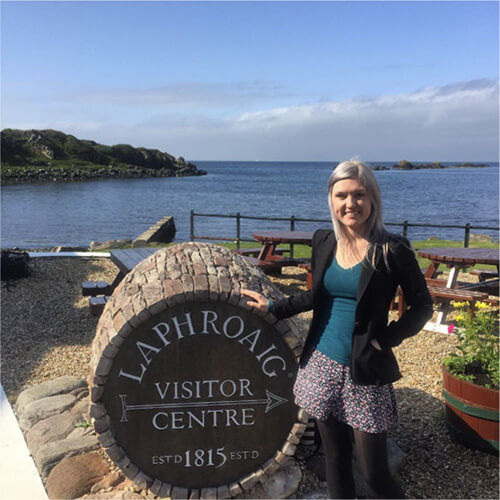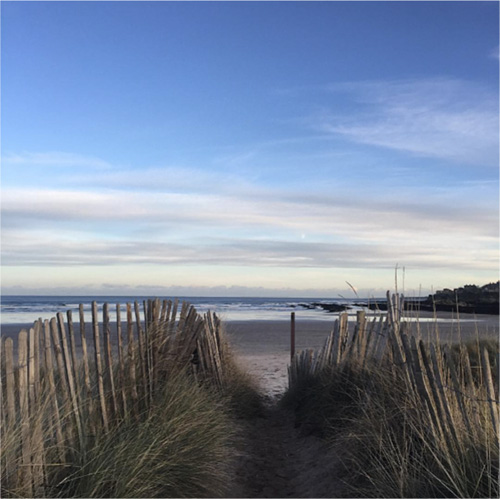A Student Guide to Living and Study Abroad in Scotland
Article and photos by Lex Voytek

|
|
A waterfall in the Scottish Highlands.
|
I graduated with my B.A. in Creative Writing from the University of New Mexico. My friends asked me what I would do with such an “impractical degree.” I told them, “I’m going to travel the world and write stories.” I subsequently decided to apply to study abroad for my master’s at the University of Stirling in Scotland for 2015-2016.
Stirling was the most significant decision of my life, but there are formalities to address when living and studying abroad. The first time I waltzed into the U.K. I thought I'd have all the mundane formalities sorted by week two. I was wrong!
Practically speaking, here are some of the primary considerations when applying for University and arriving in Scotland:
Costs
I chose to apply for education abroad for many reasons, but first, let’s talk about costs, as money and funding often hold us back from pursuing our goals. Even as an international student, the tuition costs and the exchange rate from pounds to dollars were very favorable. Direct study abroad remains much cheaper than every school I applied for in the U.S. There are a few caveats to this statement. Though the tuition was more affordable, I found that scholarships available for my program were harder to come by as an international student from the U.S. The available scholarships remain very competitive. The application deadlines are usually in the fall of the year before the program starts, so planning is necessary. I had to pay out of pocket, but it was possible to receive federal student loans.
The cost of living is more mixed. Some things are cheaper, including essential foods such as dairy products, bread, and vegetables; others are way more expensive. Gas (petrol) was almost four times the cost of gas in the U.S., which extended to utility costs in the home. Also, the cost of alcohol and cigarettes (don’t smoke!) is high because of steep taxes. As I mentioned, I used loans, but while some people buy fancy new cars, I bought an education and the experience of a lifetime. I regret nothing.
Visa Processing Time
Initially, I chose the University of Stirling because I could bring my long-term partner with me. You should consider this personal requirement if you have family or partners that you cannot leave behind because it can make the visa process more complicated. In our case, we were both accepted into the school, which was lucky for us. We applied for separate but compatible student visas, so we were allowed into the country at the same time and to remain for the same amount of time.
The actual visa process takes a while, so get on that ASAP. Do not wait until the last second to apply for acceptance into a school or for scholarships, because all of these stages will be separate but must include dependent applications. Since I had to wait a little longer than I should have, my visa cost a few thousand dollars in general fees. I expedited processing to receive my visa in time to depart. We both received our visas the day before our plane took off. We were nervous wrecks that final day, of course.
The visa includes membership in the NHS and its healthcare system. Side note: my partner contracted pneumonia while we were there, and he was seen and immediately attended to by doctors for free. He was well in less than a week, so even though we had to buy into the NHS with our visa, it was well worth it.
Also, because of political conflicts within Europe, our visas limited our ability to work as students more than they typically would have even a year prior. Usually, students are allowed to work 20 hours in a term and 40 hours out of the term. However, to discourage too much immigration, the policy has been tightened until further notice. Currently, work is allowed 20 hours during and 0 hours outside the term. The new policy makes it almost impossible to hold a job. We had a few weeks where we ate nothing but frozen pizzas to balance our lack of budgeting for this possibility.
Banking
Acquiring a bank account involves a song and dance I had not rehearsed. If you don't have previous U.K. credit or a U.K. address, then you can't get a bank account, but if you don't have a bank account, you can't rent a place to get an address. This Catch-22 was one of the biggest initial headaches I faced once I landed in Scotland. I solved this by going to the bank on campus, and the bankers ended up helping me to find a workaround. Usually, that is how I got myself out of jams — I showed up, explained my situation, and made contacts where needed. It’s simple and not a guarantee, but sometimes faith in humanity, being social and friendly, and asking for help can be the best way to solve an issue. The Scottish people made it easy, though — more on that soon!
Housing

|
|
Our coach house and conservatory.
|
If you plan to live in student housing, which many do, then the following passage will not be relevant. I chose not to opt for student accommodations because I was a graduate student and not as well-suited to dorms anymore. I had a partner who would have had to get separate accommodations if we had chosen that route. Since student housing is quite expensive, we decided to find off-campus housing.
Houses are hard to find, and most Scottish students rush for accommodations simultaneously. I lucked out with a great place — the best place I've ever lived — in the "posh side of town." As I mentioned previously regarding banking, it was necessary to be diligent, not give up, and show that I was friendly and trustworthy. But it was a little scary for the first month, and I wondered if I would ever stop living in hostels and B&Bs.
I had booked a week’s hotel accommodation upon arrival in Scotland, thinking that was even a little excessive. I ran into the first snag with the banking situation. Then, more trouble came when I discovered that most renting agencies are biased against students. I had to fall back on a pretentious graduate student performance. I assured agencies that I spent nights quietly drinking whisky and bantering about current events with my partner (actually true) and that I was too old to participate in "Freshers," which is what they call the first week of the semester where all the students come back to "Uni" and party at the clubs. Meeting with my landlord convinced him I would not burn his place down in a crazy house party. Still, it was touch and go, as my options for housing were minimal.
Ultimately, it all worked out, and rent, especially for our gorgeous coach house nestled among pristine Victorian mansions, walking distance to the town center and the Stirling Castle, was affordable for two people at £750 total. The rent included two bedrooms, two bathrooms, a backyard, a beautiful sunroom (they call a conservatory), and unlimited free access to the castle.
I advise looking into all options well ahead of time and contacting agencies and landlords immediately — if you can, try to do this even before you arrive.
Transportation
Now for the good news! First of all, transportation is excellent. The buses are a bargain — £1.50 round trip for students from the town center to campus, and all stops in between. The trains are excellent, and you can easily travel all across the U.K. relatively cheaply. Many places are also within walking distance. Even cabs are affordable in a pinch – especially if you’re out with friends who can split the fare. I even bought a car for a mere £350! It was a 2002 Toyota Yaris with 75,000 miles. It was a great car, but that came from making friends in pubs — which will be impossible not to do unless you go out of your way to shun people. Having a car isn’t necessary, but I found exploring more of Scotland in my own time advantageous. Plus, you can drive for up to a year on an American license before getting a U.K. license. The differences in driving alone (on a different side of the road, for example) could be the source of an article!
People
More good news! The people are some of the most friendly, helpful, and genuine I have ever met. I met lifelong friends who were willing to do things above and beyond when needed.
My first friend, who has come to be part of my Scottish family, was made after walking into a whisky shop. I knew my stuff about "scotch" and even that the Scots don’t call it scotch — they call it whisky — without the "e." The man working at the shop instantly developed a liking for me and invited my partner and me to a little pub nearby. From there, I received invitations to meet more people through whisky tastings and pub gatherings. Soon, I received an invitation to Hogmanay. During this Scottish New Year celebration, friends and the whole village come together in one of the most genuine displays of generosity and merriment I have ever participated in. I brought tamales, an adventurous choice, but my Scottish friends loved it, even with the spice. They made haggis, and I tried it and, much to my surprise, liked it!
My advice is to be willing to try new things and participate whenever you can, and things will more easily fall into place. In my experience, once I was willing to join, laugh, and learn, people were almost always willing to be there for me when needed.

|
|
The author here in Islay, embarking on distillery tours.
|
Education
Finally, allow me a few brief words on the educational experience in the classroom that complements the experiential learning outside of the academic world.
I found studying in the U.K. to be a very different experience from studying in the U.S. Much more independent study is involved than what I was initially used to at home, so it can be tempting to become lazy and enjoy the extended vacation. There are typically only two assignments — a midterm and a final exam — with no explicit homework. At first, I found this approach difficult to balance, but ultimately, I learned more.
With the education gained, I am ready for success as a writer. I have placed in a big writing contest, found some success as a freelance writer, and set myself up for my future Ph.D. studies in Scotland — again, achievements worthy of a separate article.
In the End
I recommend studying abroad for anyone who is willing to plunge into the unknown, loves adventure, and accepts the challenges involved in stepping outside of their comfort zone. It takes creativity, willingness to take on the unexpected, and resilience when things don’t work out as planned, but in the end, it is worth any headache endured and every penny spent.
In my case, my studies and adventures transformed me, and I am far better as a writer and a person for having experienced the journey.
Slainte mhath!

|
|
The North Sea, St. Andrews.
|
|
Lex Voytek is from Albuquerque, New Mexico, and graduated from the University of New Mexico with her B.A. in Creative Writing. From her travels abroad as a teenager, she has long loved the U.K. and Ireland. For this reason, she applied to master's programs in these countries and made her final decision to study in Scotland at the University of Stirling.
|
|
